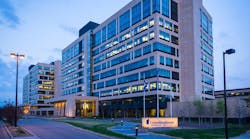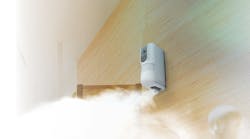According to a new report issued this week by market research firm Frost & Sullivan, the healthcare security market is expected to see large growth over the next several years, due in large part to compliance requirements placed on the industry by various government regulations.
The "World Healthcare Security Markets" report estimates that the market will reach $5.78 billion in 2014, a nearly 250 percent increase from the $1.66 billion in revenues the market garnered in 2007.
Though there may be efforts to enhance access control or CCTV systems at individual facilities, Frost & Sullivan Research Analyst Santosh Antony, said that one of the emerging trends in the healthcare sector is an increase in the number of integrated security systems being sought by the healthcare market.
Also, because of laws such as the Health Insurance Portability and Accountability Act (HIPPA), there will also be a big focus among healthcare facilities on improving not just physical security, but logical or data security as well.
"Although physical security has traditionally dominated logical security, we believe that logical security is going to come up in a big way," Antony said. "ID and access management will become a very key focus of any turn-key solution."
One of the biggest challenges that the industry faces, however, is the implementation of security systems that not only effectively secure data, but also allows doctors and other medical personnel instant access to records because just a few seconds can mean the difference between life and death in healthcare.
"From the end-user’s perspective, speed is very important because there are a lot of systems which contain doctors adding in lots of passwords and keywords and waiting two-to-three minutes or even more, which in a hospital can be extremely dangerous," he added.
Antony believes that this need for quicker access will open up opportunities for the use of biometric solutions in healthcare.
Other technologies that could see growth in the healthcare industry are network security and asset tracking solutions to prevent hackers from gaining access to protected data.
"Approximately 50 percent of misappropriated patient data is from stolen mobile (devices) and laptops," Antony said. "So it’s very important to have such devices that can either track the stolen device and recover it or at least remotely delete the data."
As far as the future of the healthcare security market is concerned, Antony said that he believes that it’s important for dealers and integrators to educate the healthcare sector about the threats they face and push them to improve their security standards beyond just what is required by the government and adopt the technological advances in security instead of viewing them as a hindrance.
"In a lot of cases (healthcare facilities) are just looking to meet the compliance standards and even then, often they are not 100 percent compliant, but they keep that as the benchmark and that is not correct," he said. "The benchmark is to provide the ultimate security solution at each healthcare facility because that is what’s required."

